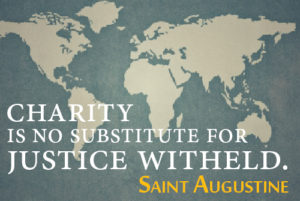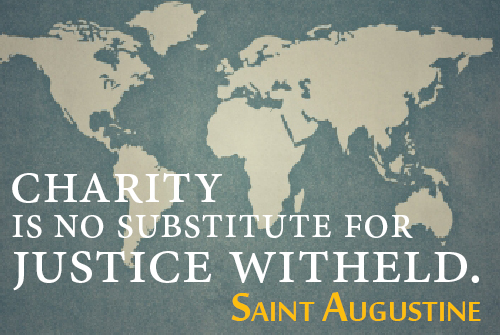The #GivingTuesday hubbub has died down. Our organization made its declaration why we don’t get over-involved, and now my fellow do-gooders I have a question to ask you:
Are you proud of how your organization raised funding that day?
And all days, in fact?
When you look at the webpages, the social media graphics, the videos, all the “products” designed to get everyday people in rich countries to open their wallets, do you recognize your values and the values your organization represents?
If the answer is yes, then right on! You are working among the ever-growing group of international organizations using more sound practices in communicating about how we overcome global poverty in our sector. Or you may be part of the ever-shrinking group of people who think that “whatever strategies get $ through the door is fine, since it’s going to a good cause.”
To the first group, I say: Keep going! Keep pushing to understand further the societal messages/public perceptions that are the “baseline” of where nonprofit communications land. How might we hold ourselves responsible for helping to shift narrative frames that uphold racism, white supremacy, economic inequality, etc.? (A great tool for understanding your own implicit biases is here, and for challenging your own biases is here.)
 To the latter group, I say: Our first duty as humanitarians (or whatever word that best describes your do-gooder role) is uphold the dignity of every person. The communications departments in your organizations are beholden to the same standard and are serving the same mission. Upholding the dignity of every person in their job descriptions means not detracting from the dignity or strength of any human (child or adult) in how they portray people or the work of the organization itself. Given the complex and endemic challenges we are up against, lazily relying on old notions of charity in our communications are not good enough. The least we can do is help challenge “the other” as a basis for continued exploitation and neocolonialism.
To the latter group, I say: Our first duty as humanitarians (or whatever word that best describes your do-gooder role) is uphold the dignity of every person. The communications departments in your organizations are beholden to the same standard and are serving the same mission. Upholding the dignity of every person in their job descriptions means not detracting from the dignity or strength of any human (child or adult) in how they portray people or the work of the organization itself. Given the complex and endemic challenges we are up against, lazily relying on old notions of charity in our communications are not good enough. The least we can do is help challenge “the other” as a basis for continued exploitation and neocolonialism.
And to those who may not be so proud of their organizations’ communications products, I suggest the following: say something. Because it is the speaking up time.
I’m going to make it easy on you, dear reader. For a myriad of reasons, you may be too fearful to say what you want to say in the kitchen while warming your lunch or grabbing a cup of tea, i.e. “Hey, I had some thoughts about the blog I saw last week.” The following is a draft email for you to send to your Director of Communications (or any colleagues on the communications team) to start the conversation. Be warned: They may want to have one and it may require more work from you.
All the disclaimers apply. I don’t know your organization’s communications team, their strategy, their history, your history, the organization’s values, or hypocrisies. Basically, assume I know nothing about your circumstances. Adapt for your context. Recognize that communications professionals have a specific skill set that you do not. In-person feedback is always better than email, and so forth. In other words, don’t take this as 1-2-3 how-to advice.
But I do believe an intervention IS worth it, even if it doesn’t go anywhere, even if you feel there’s a total shutdown or dismissal of you or your concerns. The path is cleared for someone else to do the same. Seeds are planted. I unapologetically believe that every time you stand up for the truth you know deep inside you, you are changed. Every time you learn lessons that support you to be a more effective advocate for what people need, for what the world needs. And much more than paper pushing, isn’t that our job at the end of the day!?
So here goes. As a Director of Communication myself, I hope this classic sandwiched feedback is something that I could receive and respond to constructively. (And yes, I may have poured it on a little thick to pad egos.):
Dear [insert name],
Thank you for everything you do to share our organization’s mission, the work my team and many others do all day, and the stories that showcase why our work together is so important. I know that communications teams in our nonprofit sector are often under-resourced and under-recognized. All the work that goes into our “brand” – from the strategies and policies to the website, the advertisements, social media posts, the videos, etc. – requires specific planning, effort, and skill.
I want to share with you some thoughts I had when I took a look at our recent [insert communications product]. My role at [insert organization name] is to [insert phrase that describes your program/work]. That means that I have to [insert a description of your work that you would share with your grandmother]. As a result, I [insert example from your work where you find evidence to the contrary of the key indignity you see in the communication product].
I would love to share more about this with you. [Now – and only now – do you get to describe specifically(!) what you found insulting or disrespectful. Don’t just say, “It is offensive.” Say, “The photo you used depicted a child without any context around them. This perpetuates the idea(s) that…”]
I know that at [insert organization name], we owe it to the people we serve to not detract from their strength or dignity in how we portray them or our work. I believe that our communications team is capable of doing everything it can to fulfill this mandate and meet the demands of fundraising. Striking this balance between raising money for people who need it and not trivializing or oversimplifying the reality of people’s lives requires context, consent, skills (that frankly I don’t presume to have), and lots of listening and honesty. But I believe we can work together to build narratives and share stories from a space of what it means to imagine and create thriving communities and families around the world.
I want [insert organization name] to honor the fullness of people’s lives, no matter the circumstances, and I am happy to support that in any way that I can. Please feel free to reach out anytime to discuss this [insert communications product] further or any feedback on any future products as well.
With respect and admiration for all that you do,
[insert your name – anonymity is for cowards]
If you do use this email to start a conversation, please let me know in the comments how it goes!

